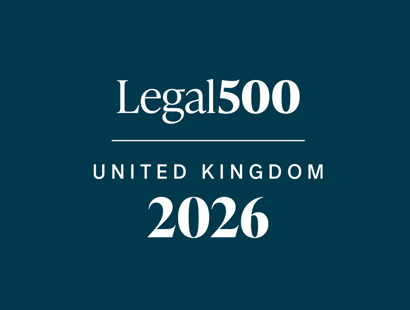
Can AI replace a lawyer for startups?
It is easy to see the appeal of using AI tools when trying to grow a business with limited resources. Lawyers can be very expensive and few startups have a big legal budget, if any.
However, whilst there are undoubtedly benefits in using AI for your business there are also times when using a lawyer will be more valuable in the long-run. In this briefing, associate Ben Voller explores the situations where AI can be used effectively, who is liable if AI makes a mistake, and when it makes more sense to instruct a lawyer.
When can I use AI instead of a lawyer?
AI is a powerful, cost-efficient tool which can provide instant access to information. We have seen startups use it really effectively in the following ways:
- Understanding basic legal concepts. If you have never used lawyers before, AI may be helpful in a similar way to a search engine for understanding some basic legal concepts. However, it’s always worth tracing the source of its answers where available and cross-checking explanations and sources. Large-language models such as ChatGPT work in a similar way to search engines like Google by scouring what’s already on the internet, so the outputs are only as good as the source material and all large language models will hallucinate (i.e. make up) incorrect information from time to time.
- Summarising documents. Legal documents can be long and dense. AI can also be useful for summarising material using non-legal language in a shorter form. However, make sure you aren’t including personal or confidential information in your prompts and for really important documents be cautious as something important could be missed.
- Comparing documents. In the same way AI can summarise documents, it can also quickly compare documents. Remember, don’t include personal or confidential information and don’t assume the results are comprehensive.
- A sounding board and ideas-generator. We have all been there, sometimes you just don’t know exactly what you need. AI can provide a great sounding board for generating ideas and working out what you might need or should be thinking about. It might even help identify some helpful questions to ask your lawyers.
- Research. AI will provide fast responses and potentially detailed lists of source materials for research purposes, which you can then review independently.
Can I use AI for drafting legal documents?
We wouldn’t recommend it.
There is a significant exposure to risk by using an AI produced legal document. Whilst the software may understand your prompt, it is unlikely to understand your business and the commercial landscape in which it operates and may be unaware of key human-level psychological or political judgements about the approach to counter-parties.
Legal documents can be detailed and complex and there is rarely a ‘once size fits all’ solution. Specifically, AI may not understand the scope and scale of your business, certain jurisdictional, compliance or industry-specific regulatory issues, or the current legal landscape. Nor does AI know your risk appetite, negotiating position and what questions to ask.
In the absence of review and critical analysis by a lawyer the document may contain inaccuracies, hallucinations, the absence of critical clauses, irrelevant clauses, unenforceable provisions and entirely fictional legal concepts (all of which we’ve seen!)
What are the risks of using AI for drafting legal documents?
The primary risk of using AI to draft legal documents is that a contract is incorrect or unenforceable. Either of these may have significant financial or reputational repercussions. In addition, providing incorrect or inappropriate drafting to investors or customers could at best be embarrassing (documents which have been drafted by AI can (at least right now) be relatively easily spotted by experienced professionals), and at worst may cause the other party to withdraw from the deal.
Am I liable if AI makes a mistake?
Yes, you can be. AI cannot provide regulated legal advice and you certainly won’t be able to blame AI if things go wrong. Whereas lawyers have a professional obligation and are accountable for the advice they provide (we also are required to have professional indemnity insurance).
Entering into defective legal documents, gives rise to obligations which, if breached, may give rise to a claim against you or your business. The higher the value and the longer term of the agreement, the greater the risks and liability.
When should I use a lawyer for my startup?
We recommend seeking the advice of a lawyer:
- For important decisions or documents. If the stakes are high or you are taking on legal liability, you need a lawyer. For example, if you want to draw up the terms and conditions for the provision of services to your customers, this is absolutely crucial to your business and should be prepared by a lawyer.
- If there are legal complexities. Some documents need to be drafted in such a way that reflects a complex legislative background. For example, if you want to put in place an EMI option scheme with potentially significant tax benefits, the relevant agreements and process for adopting them needs to be precise and contain certain key terms. If missed or misjudged, this can scupper the potential tax benefits, having a negative financial impact on the company and optionholders.
- For drafting binding legal documents. Binding legal documents create obligations and liabilities on both parties. If you want an arrangement to have legal effect, such as the agreement between you and your co-founder as to who owns how many shares in your company and what happens if one of you leaves, this should be overseen by a lawyer.
- For regulated advice. AI-generated advice should not be relied on for regulated activities and industries. An example could be data protection and the issues arising out of the General Data Protection Regulations (GDPR). Here it is not just about knowing the rules, it is about how to apply them to ensure you are compliant. A lawyer will be able to assist not only in understanding the rules but helping apply them specifically to your business.
About Ben
Ben Voller is an associate in the corporate and commercial team.
Get in touch
If you would like to speak with a member of the team you can contact our corporate and commercial solicitors by telephone on +44 (0)20 3826 7511 or complete our enquiry form.









